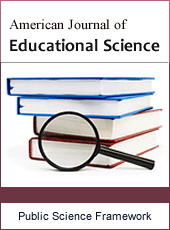American Journal of Educational Science
Articles Information
American Journal of Educational Science, Vol.1, No.5, Nov. 2015, Pub. Date: Sep. 26, 2015
Gender Bias in Primary School Mathematics Textbooks in Nigeria
Pages: 223-228 Views: 4091 Downloads: 4090
[01]
Zinyahs Maris Zakka, Faculty of Education, Department of Educational Sciences, Mathematics and Creative Multimedia, Universiti Teknologi Malaysia (UTM), Johor Bahru, Malaysia.
[02]
Noor Azlan Bin Ahmad Zanzali, Faculty of Education, Department of Educational Sciences, Mathematics and Creative Multimedia, Universiti Teknologi Malaysia (UTM), Johor Bahru, Malaysia.
Mathematics textbooks are embedded with bias in favour of male characters which affects the self-esteem and self-confidence of female students. The study examines gender bias in primary schools mathematics textbooks in Nigeria. Content Analysis approach that involves the Descriptive Statistics tool was used to count the number of male and female and gender neutral characters. The frequency and percentage of male and female gender characters, and gender neutral characters were calculated. The findings of the study revealed that there is gender bias in favour of more male characters with prejudice to female ones in the two textbooks, especially more so in primary 5 mathematics textbook than primary 6. Based on the findings of the study, it was recommended that there is the need to create awareness of the existence of gender bias in mathematics textbooks through workshops and seminars for teachers, curriculum planner, policy makers and authors.
Gender Bias, Gender Neutral Character, Content Analysis, and Mathematics Textbooks
[01]
Amini, M. and Birjandi, P. (2012). Gender Bias in Iranian High School EFL Textbooks Vol. 5 no. 2 DOI: 10.5539/elt.v5n2p134. Retrieved from www.ccsenet.org/journal/index: php/elt/article/view/14570/9935 0n 8th July 2014.
[02]
Bahiyah Dato’ Hj, Abdul Hamid, Mohd Subakir Mohd Yasin, Kesumawati Abu Bakar, Yuen Chee Keong and Azhar Jaladdin, (2008). Linguistic Sexism and Gender Role Stereotyping in Malaysia English Language Textbooks. GEMAo online Journal of Language Studies Vol. 8(2).
[03]
Blumberg, R.L. (2007). Gender Bias in Textbooks: A Hidden Obstacle on the Road to Gender Equality in Education. A Paper Commissioned for the EFA Global Monitoring Report 2008, Education for All by 2015 pp. 1-54.
[04]
Brugeilles, C., and Cromer, S. (2009). Analysing Gender Representations in School Textbooks. Centre Population and Development (CePeD). Siege 45, rue des Sanit Peres – 75006 Paris - France.
[05]
Carthon, J. T. (2003). Representation of Gender in Middle Grades Mathematics Textbooks used in Southwest Georgia. Unpublished Dissertation Submitted to the Graduate School Valdosta State University.
[06]
Chanzanagh, H.E., Esmaeelzadeh, Z., and Zarsazkar, M. (2011). Gender in School: A Case-Study on Iran’s Primary Levels- School Subjects. Procedia Social and Behavioral Sciences 15(2011) 1832-1838.
[07]
Gharbavi, A., Mousavi, S. A. (2012). A Content Analysis of Textbooks: Investigating Gender Bias as a Social Prominence in Iranian High School English Textbooks. Retrieved on 15 March, 2013 from http://dx.doi.org/10.543/elr.v1n1p42.
[08]
Jodelet, D. (1989). Representations Sociales: un Domaine an Expansion, in Jodelet D (dir.), Les Representations Sociales. Paris, PUF: 47-48.
[09]
Khurshid, S., Gillani, I. G. and Hashmi, M. A. (2010). A Study of the Representation of Female Images in the Textbooks of English and Urdu at Secondary School Level. Pakinstan Journal of social sciences (PJSS) vol. 30, No.2 pp 425-437.
[10]
Mineshima, M. (2008). Gender Representations in an EFT textbooks. Retrieved from www.niit.ac.jp//ib/contents/kiyo/genko/13/14_MINESHIMA.pdf on 8th July, 2014.
[11]
Mohamad Subakir Mohd Yasin, Bahiyah AbdulHamid, Zarina Othman, Kesumawati Abubakar, Fuzirah hashim and Azmah Mohti, (2012). A visual Analysis of Malaysian English school textbooks gender matters. Asian social science Journal Vol. 8, no. 12 pg 154-163.
[12]
Mukundan, J. and Nimehchisalem, V. (2008). Gender Representation in Malaysian Secondary School English Language Textbooks. Indonesian Journal of English language teaching, Vol. 4, no. 2.
[13]
Mustapha, S. A. (2012). Gender Equality in and through Education: Gender Representation in Learning Materials Project Report Unpblished. Retrieved on 5th March, 2013 from http://shura.shu.ac.uk/55031.
[14]
Mutekwe, E. and Modiba, M. (2012). An Evaluation of the Gender Sensitive Nature of Selected Textbooks in the Zimbabwean Secondary School Curriculum. Anthropologists, 14(4): 365-373.
[15]
Nachmias, D. & Nachmias, C. (1976). Content Analysis. In Research Methods in the Social Sciences (pp. 132-139), UK: Edward Arnold.
[16]
Oyebola, O. (2003). Gender Issues in Textbook Development: A Study of Gender Balance in Illustrations of Selected Textbooks for Upper Primary Level.
[17]
Plumm, K.M (2008). Technology in the Classroom: Burning the Bridges to the Gaps in Gender Biased Education? Computers and Education 1052-1068.
[18]
Sadker, D and Zittlman, K. (2007). “Gender Bias from the Colonial America to Today’s Classroom.”Pp.135-169 in Multicultural Education: Issues and Perspectives, edited by James A. Banks and Cherry A, McGee Banks. Hoboken, NJ: John Wiley and sons. Inc.
[19]
Shah, S. S. (2012). Gender Inclusion: A Neglected Aspect of the English Textbooks in Pakistan. International Journal Social Science and Education.vol. 3 pp. 118-127.
[20]
Sunar, S. (2011). Analysis of Science Textbooks for A levels in the UK: Issues of Gender Representation. Retrieved from www.esera.org on 4th May, 2013.
[21]
Tang, H. Chen, B, & Zhang, W. (2010). Gender Issues in Mathematical Textbooks of Primary Schools. Journal of mathematics Education Vol. 3 no. 2, pp. 106-144.
[22]
Tietz, W. M. (2007) The Representation of Gender in Introductory Accounting Textbooks. A PhD Dissertation Submitted to the Kent State University.
[23]
Zilimu, J. A (2014). Exploring the Gender Gap in Tanzanian Secondary School Mathematics Classroom. A PhD dissertation submitted to University of Illinois Urbana.

ISSN Print: 2381-7127
ISSN Online: 2381-7135
Current Issue:
Vol. 6, Issue 2, June Submit a Manuscript Join Editorial Board Join Reviewer Team
ISSN Online: 2381-7135
Current Issue:
Vol. 6, Issue 2, June Submit a Manuscript Join Editorial Board Join Reviewer Team
| About This Journal |
| All Issues |
| Open Access |
| Indexing |
| Payment Information |
| Author Guidelines |
| Review Process |
| Publication Ethics |
| Editorial Board |
| Peer Reviewers |


